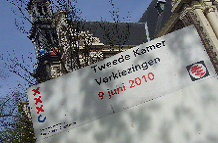Na het sneuvelen van onze spreekwoordelijke tolerantie en openheid ten opzichte van andersdenkenden en vreemde culturen, leek in 2010 het buitenlandbeleid aan de beurt. Raar is dat niet. Als een land meer benepen en naar binnen gericht wordt, heeft dat ook gevolgen voor het buitenlandbeleid. Het lijkt alsof een hernieuwde Jan Saliegeest door ons ontredderde landje waart. Ter herinnering: Potgieter beschreef in zijn allegorie ’Jan, Jannetje en hun jongste kind’ (1841) hoe de lamlendige Jan Salie het herstel van Nederland frustreerde. Een zwakke volksgeest en een gebrekkig cultureel leven zorgden volgens Potgieter voor te langzame aanpassing aan de nieuwe industriële revolutie. Nu heeft Nederland moeite met de nieuwe tijd van immigratie en de gevolgen van mondialisering, terwijl de nieuw aangetreden regering hard op cultuur bezuinigt.
In 2010 leek Jan Salie ook grip op het buitenlandbeleid te krijgen. Want typisch Nederlandse kenmerken komen steeds meer onder druk te staan. Kenmerken die volgens veel politicologen en historici bepalend zijn geweest voor onze naoorlogse welvaart. Allereerst staat de legalistische benadering in de buitenlandse politiek onder druk. Nadruk op rechtsorde en humaniteit passen binnen de typisch Nederlandse traditie van Hugo de Groot, maar maken blijkens het regeerakkoord plaats voor behartiging van economische belangen. Op zich is er niets mis met een dergelijke herijking, maar het is wel on-Nederlands. En door het Nederlandse populisme dreigt doorslaan naar een buitenlandbeleid dat alleen om eigenbelang draait.
Voorts lijkt het idee passé dat internationale organisaties de internationale rechtsorde kunnen versterken en dat dit in ons belang is. Ooit liepen wij voorop bij het oprichten en versterken van internationale instituties, stonden we aan de bakermat van de Europese integratie, en speelden we een belangrijke rol in mondiale instituties zoals de VN en de Wereldbank. Nu laten we onze plaats in de G20 lopen en vinden we de Europese integratie eerder een hinder dan een voordeel.
Tot slot is sinds de Tweede Wereldoorlog het defensiebeleid vormgegeven via de trans-Atlantische verhouding en de Navo. Maar door de wijze waarop Nederland in 2010 uit Afghanistan is vertrokken en de onmacht om snel met een nieuwe missie te komen, is Nederland de risee van de Navo geworden en heeft het vertrouwen van de Amerikanen in ons land een ferme knauw gekregen. Als wij niets voor Amerika kunnen betekenen, zal het omgekeerde ook gelden. Hebben we een alternatief of zien we het buitenland alleen nog maar als bedreiging?
Het lijkt op dat laatste. Nederland lijkt nu vooroorlogse reflexen te vertonen, zoals de toenmalige politiek van afzijdigheid. Dit en het antimilitarisme van het gebroken geweertje pakten rampzalig uit. Ook nu trekken we ons terug achter de dijken, willen we niet meer deelnemen aan vredesmissies en bezuinigen we de krijgsmacht weg. Maar juist nu vereisen uitdagingen zoals de opkomst van China, grondstoffenschaarste, piraterij en terrorisme een actief en loyaal buitenlandbeleid. Of 2010 daadwerkelijk een omslag is, moet nog blijken. Als dit kabinet volgend jaar niet toegeeft aan populistische sentimenten en een actief beleid voert gericht op veiligheid en welvaart, dan hoeft dit niet het geval te zijn.
Trouw






